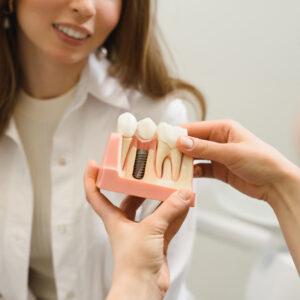
When teeth are damaged or decayed to the point they cannot be saved or are otherwise knocked out or “avulsed,” dental implants are the safest and best option for restoring your smile. However, even artificial teeth need to be properly cared for to prolong their durability and prevent future dental issues from endangering your oral health. Let’s take a look at five pieces of dentist-approved advice for optimal dental implant care.
What Are Dental Implants?
Dental implants can look different depending on the problems they’re intended to fix. There are similarities between dental implants vs crowns but simply put, implants are dental prosthetics comprised of an artificial root that is implanted into the jaw bone to create a sturdy base for a ceramic or similarly durable artificial tooth that is shaped and color-matched to fit your natural smile. Dental implants can hold a single tooth or an entire row depending on how many anchor points they have in your mouth, and are durable and realistic enough to be a permanent replacement for missing teeth—unlike dentures.
The Importance of Good Oral Hygiene for Teeth Implants
Dental implants are more permanent than dentures, are just about as strong as your natural teeth, and look indistinguishable from your organic smile, but strict care after dental implants have been installed is necessary to keep them properly functioning and to protect the rest of your mouth as well. Following the dental implant care tips can help protect the investment you made in your mouth.
1. Brush and Floss Daily
Just like with your natural teeth, brushing and flossing daily is the cornerstone of good dental implant care. When you eat and drink, bacteria feed on the leftover food in your mouth and produce harmful byproducts. Since dental implants have a porcelain or resin crown, patients with implants don’t have to worry about dental cavities, but not brushing and flossing can still result in gum disease.
Over time, untreated gum disease can worsen and spread to other structures in your mouth, including the bone and tissues in which your prosthetic is implanted. When the underlying anchor becomes too weak, your dental implants could fail, and alternative surgeries might have to be performed. For optimal dental implant care, brush twice per day with a soft, nylon brush and a dentist-approved toothpaste, and floss between all of your teeth—implanted or not—once per day.
2. Avoid Abrasive Products
Certain brushes and even toothpastes can have abrasive aspects to them that can harm dental implants. In fact, even brushing too firmly or rigorously can result in the gradual decay of your implant, causing discoloration or even structural weakness. This can even include avoiding overly hard or crunchy foods, as they can weaken the integrity of your implant over time.
3. Rinse Your Teeth
This goes along with your daily oral hygiene habits, but simply rinsing your mouth out with clean water in between meals can stop food particles from accumulating and forming tartar and plaque. Simple maintenance like this makes cleaning easier over time and goes a long way in your overall dental implant care.
4. Limit Alcohol Consumption
Dental implant surgery takes a toll on your mouth and body, as it can take up to six months for the surgical site to heal fully and for the bone to fully accept the implant. Alcohol (as well as smoking) has been proven to slow the body’s natural healing process and can result in longer healing times and a greater risk of infection and other complications in the meantime.
Related: Check out what to eat after dental implant surgery.
5. Routine Dental Check-Ups
Perhaps one of the easiest and still most important aspects of dental implant care is continuing to see your dentist for routine checkups and cleanings. Dental implants still benefit from the kind of deep cleaning that only a dental professional can perform, and your dentist will be able to check the integrity of the implant for potential adjustments that need to be made, as well as the health of the surrounding tissues.
Are You Ready for Dental Implant Care?
Dental implant care is important to get the most out of your implants and prolong their effectiveness. While it can be a big responsibility, the result is a strong, natural-feeling prosthetic that can restore a damaged and decayed smile. If you have questions about dental implant aftercare, dental implant surgery, or other restorative dentistry in Sparks, NV, call the experts at Champagne Family Dentistry in Sparks, and we’ll be happy to schedule your first appointment!

